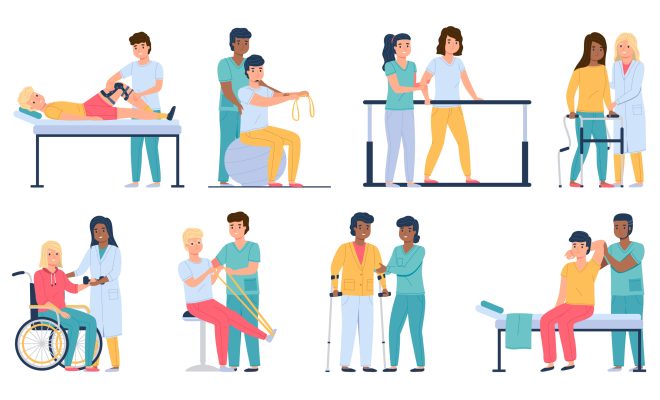Substance Abuse Rehabilitation: Pathways to Recovery

Substance abuse rehabilitation is a comprehensive approach to treating addiction to drugs or alcohol. It aims to help individuals overcome dependency, address underlying issues, and develop skills for long-term recovery and a healthier lifestyle.
Key Components of Substance Abuse Rehabilitation:
1.Assessment: Evaluating the extent of addiction and any co-occurring disorders.
2.Detoxification: Safely managing withdrawal symptoms under medical supervision.
3.Therapy: Individual and group counseling to address psychological aspects of addiction.
4.Medication-Assisted Treatment: Using medications to manage cravings and withdrawal.
5.Life Skills Training: Developing coping mechanisms and practical skills for sober living.
6.Aftercare Planning: Preparing for ongoing support and relapse prevention post-treatment.
Types of Rehabilitation Programs:
1.Inpatient Rehabilitation: 24/7 care in a residential facility.
2.Outpatient Programs: Regular treatment sessions while living at home.
3.Partial Hospitalization: Intensive daytime treatment with evenings at home.
4.Intensive Outpatient Programs: More frequent sessions than standard outpatient care.
5.Therapeutic Communities: Long-term residential programs with a focus on social learning.
Therapeutic Approaches:
1.Cognitive-Behavioral Therapy (CBT): Addressing thought patterns and behaviors.
2.Motivational Interviewing: Enhancing motivation for change. 3.12-Step Facilitation: Based on principles of Alcoholics Anonymous and similar groups.
3.Dialectical Behavior Therapy (DBT): Focusing on emotional regulation and mindfulness.
4.Family Therapy: Involving family members in the recovery process.
Challenges in Substance Abuse Rehabilitation:
1.Stigma: Overcoming social prejudices associated with addiction.
2.Dual Diagnosis: Treating co-occurring mental health disorders alongside addiction.
3.Relapse: Managing the risk and reality of returning to substance use.
4.Access to Care: Ensuring availability and affordability of treatment options.
5.Continuity of Care: Maintaining support through various stages of recovery.
Emerging Trends in Addiction Treatment:
1.Telehealth Services: Providing remote counseling and support.
2.Digital Therapeutics: Using apps and online platforms for recovery support.
3.Pharmacogenomics: Tailoring medication treatments based on genetic factors.
4.Neurofeedback: Using brain monitoring to aid in addiction treatment.
The Role of Support Systems:
1.Peer Support Groups: Connecting with others in recovery.
2.Family Involvement: Engaging family members in the recovery process.
3.Sober Living Environments: Transitional housing for those in early recovery.
4.Community Resources: Utilizing local services for ongoing support.
Measuring Treatment Success:
1.Abstinence Rates: Tracking periods of sobriety.
2.Quality of Life Improvements: Assessing overall well-being and functioning.
3.Employment and Education: Reintegration into work or academic settings.
4.Reduced Criminal Activity: Decreases in substance-related legal issues.
Prevention and Early Intervention:
1.Education Programs: Raising awareness about substance abuse risks.
2.Screening and Brief Interventions: Identifying and addressing problematic use early.
3.Community-Based Prevention: Implementing strategies at the local level.
4.Policy Measures: Enacting regulations to reduce substance availability and harm.
The Impact of Trauma in Addiction:
1.Trauma-Informed Care: Recognizing and addressing the role of trauma in addiction.
2.PTSD Treatment: Integrating trauma therapy with addiction treatment.
3.Adverse Childhood Experiences (ACEs): Understanding the link between early trauma and addiction risk.
Holistic Approaches to Recovery:
1.Nutrition and Exercise: Promoting physical health as part of recovery.
2.Mindfulness and Meditation: Incorporating stress-reduction techniques.
3.Creative Therapies: Using art, music, or writing as therapeutic tools.
4.Spiritual or Philosophical Approaches: Addressing existential aspects of recovery.
The Future of Substance Abuse Rehabilitation:
1.Personalized Treatment Plans: Tailoring approaches based on individual needs and genetic factors.
2.Integration with Primary Care: Embedding addiction treatment in general healthcare settings.
3.Artificial Intelligence in Treatment: Using AI for predictive modeling and personalized interventions.
4.Addressing New Substances: Developing treatments for emerging drugs of abuse.
Substance abuse rehabilitation is a complex and evolving field that requires a multifaceted approach. As understanding of addiction as a chronic brain disease grows, treatment methods continue to advance, offering hope for those struggling with substance use disorders. The most effective rehabilitation programs address not only the addiction itself but also the underlying psychological, social, and environmental factors that contribute to substance abuse. By combining evidence-based treatments with compassionate care and ongoing support, substance abuse rehabilitation aims to help individuals achieve lasting recovery and improved quality of life.






